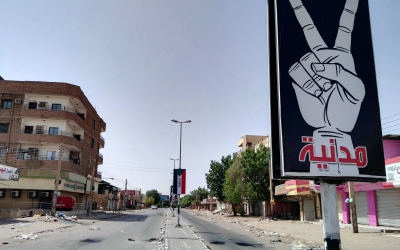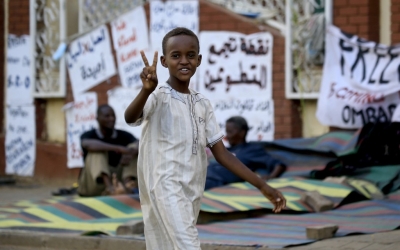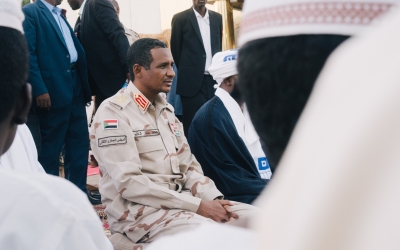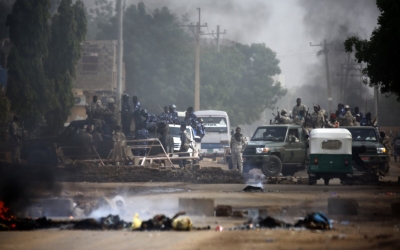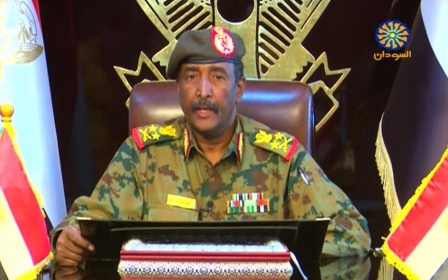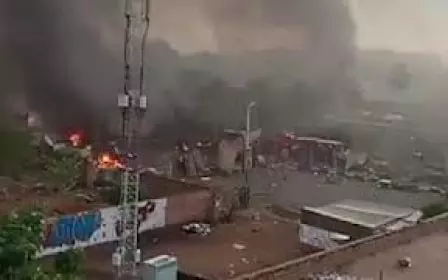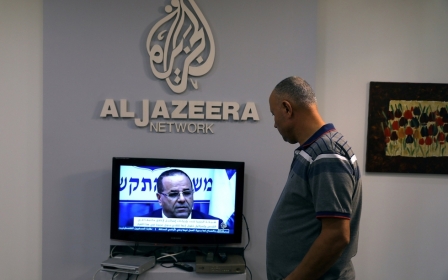Sudan's opposition calls on Arab states to end support for military council

On Monday, Sudan's opposition urged “some Arab countries” to end their support for the country’s military council, in a message seemingly aimed at Saudi Arabia and its regional allies.
In a statement issued after a crackdown by security forces left dozens of protesters dead and after the ruling military council announced that it had cancelled a power-transfer agreement with opposition leaders, the Democratic Alliance of Lawyers accused some countries of “protecting their own interests” in Sudan.
New MEE newsletter: Jerusalem Dispatch
Sign up to get the latest insights and analysis on Israel-Palestine, alongside Turkey Unpacked and other MEE newsletters
"We ask that some Arab countries lift their hands from Sudan and stop supporting the Military Council and consolidating the pillars of its rule with the aim of preserving it and protecting their own interests that are harmful to the Sudanese state and its citizens," said the alliance, part of the Sudanese Professionals Association (SPA), which has played a leading role in nearly six months of protests.
At least 35 protesters were killed and hundreds injured when security forces firing live ammunition dispersed a protest camp outside the military headquarters in Khartoum on Monday, according to opposition-aligned doctors.
'Systematic and planned'
Early on Tuesday, the head of the military council, General Abdel Fattah al-Burhan, announced the cancellation of a three-year power-transfer deal agreed with protesters and said that elections would be held in nine months under “regional and international supervision”.
Opposition leaders rejected the move and accused the ruling council of a “systematic and planned” crackdown. They urged protesters to return to the streets for Eid prayers, to honour those killed on Monday and to “demonstrate peacefully”.
Images from Khartoum showed small groups of protesters manning barricades of bricks, burning tyres and rubble, with some making victory signs at photographers.
But security forces continued to maintain a heavy presence on the streets. In Omdurman, Khartoum's twin city on the other side of the Nile, the AFP news agency said that Rapid Support Forces militia units and police had used live fire to disperse protesters gathered at barricades.
"We gathered in our square as we usually do every year but the Rapid Support Forces and the police fired teargas and soundbombs at us and after the prayers the youth closed the main street by putting up barricades," a resident of the Bahri area told AFP by phone.
Sudan's protests: A brief timeline
+ Show - HideSudanese protests have evolved in the space of less than six months from complaints about bread prices to calls for long-term leader Omar al-Bashir to go and demands for a civilian-led transition to democracy.
Here's a summary of the key moments so far since the protests began.
19 December 2018: People take to the streets in the city of Atbara to protest against a government decision to triple the price of bread, torching a local ruling party office. By the next day protesters on the streets of Khartoum and other cities calling for "freedom, peace, justice". Police try to disperse the crowds, resulting in at least eight deaths. Dozens more will be killed in the weeks of protest that follow
22 February 2019: Sudanese President Omar al-Bashir declares a nationwide state of emergency. He swears in a new prime minister two days later, as riot police confront hundreds of protesters calling for him to resign
6 April: Thousands gather outside the army's headquarters in Khartoum, chanting "one army, one people" in a plea for the military's support. They defy attempts by state security forces to dislodge them and troops intervene to protect them
11 April: Military authorities announce they have removed Bashir and that a transitional military council will govern for two years. Despite celebrations at Bashir's demise, protest leaders denounce the move as a "coup" and the protesters remain camped outside army headquarters.
14 April: Protest leaders call on the military council to transfer power to a civilian government
20 April: Sudan's military rulers hold a first round of talks with protest leaders
27 April: The two sides agree to establish a joint civilian-military ruling council, but talks stall over differences in the composition of the council, with both sides demanding a a majority
15 May: With negotiators reported to be close to agreeing a three-year transition to civilian rule, military leaders suspend talks and insist protesters remove barricades outside the army's headquarters. Talks resume on 19 May but break down again on 20 May, with the opposition insistent that a civilian must head the transitional governing body
28 May: Thousands of workers begin a two-day strike to pressure the military rulers and call for civilian government
3 June: At least 35 people killed and hundreds injured, according to opposition-aligned doctors, as security forces firing live ammunition move to disperse the protest camp outside army headquarters
4 June: General Abdel Fattah al-Burhan, the head of the military council, announces that all previous agreements with protest leaders are scrapped and says elections will be held in nine months
Analysts have suggested that the timing of the crackdown and the rescinding of previous agreements with protest leaders follows a deal in April between the military council and Saudi Arabia and the United Arab Emirates, in which the Gulf states pledged to provide $3bn in funds to Khartoum.
Since then, Burhan has paid visits to Saudi Arabia, the UAE and Egypt, while the deputy president of the council, Mohamed Hamdan Dagolo, the Rapid Support Forces (RSF) militia leader known as Hemeti, met with Saudi Crown Prince Mohammed bin Salman in Jeddah.
The RSF and the Sudanese military have sent soldiers to fight in Yemen as part of the Saudi-led coalition currently battling Houthi rebels in the country.
“It is obvious that behind this repression, there is the hand of Saudi Arabia and the United Arab Emirates,” Ahmed Abdelaziz, an Algerian-Sudanese analyst, told Middle East Eye’s French website.
“On 21 April, Riyadh and Abu Dhabi pledged $3 billion to Sudan. They did not do it without consideration. And this counterpart is not democracy. They want… their economic interests to be preserved.”
Call for international investigation
Monday’s crackdown has provoked widespread international condemnation from organisations including the United Nations and the African Union, as well as in Washington and European capitals.
Neither Saudi Arabia nor the UAE have commented officially on the violence. Saudi Arabia's foreign minister Ibrahim bin Abdulaziz al-Assaf said last Thursday that Riyadh supported the measures being taken by the military council in “serving the interests of the Sudanese people”.
Neighbouring Egypt said on Monday it was watching events in Sudan with “great interest” and urged all sides to “commit to calm, self-restraint and return to the negotiating table."
A spokesperson for the SPA on Tuesday rejected a proposed government-led investigation into the killings and called instead for an international inquiry into the killing of protesters.
The United Nations Security Council, which is currently chaired by Kuwait, another Gulf state, is due to discuss the situation in Sudan on Tuesday in a closed-door session requested by the UK and Germany.
Middle East Eye delivers independent and unrivalled coverage and analysis of the Middle East, North Africa and beyond. To learn more about republishing this content and the associated fees, please fill out this form. More about MEE can be found here.


